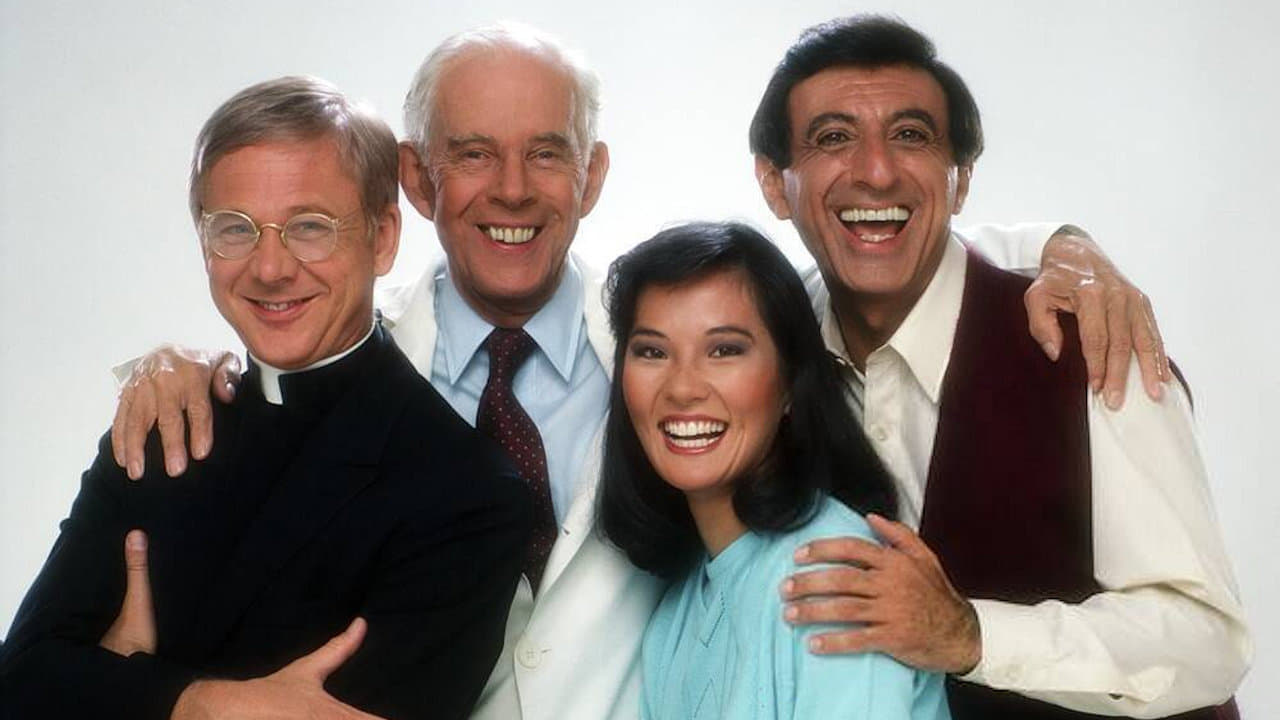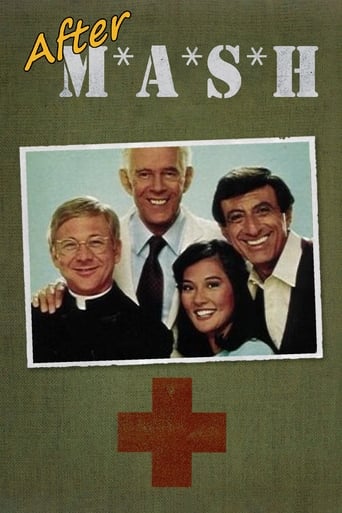

The greatest movie ever made..!
... View MorePerfectly adorable
... View MoreA terrific literary drama and character piece that shows how the process of creating art can be seen differently by those doing it and those looking at it from the outside.
... View MoreJust intense enough to provide a much-needed diversion, just lightweight enough to make you forget about it soon after it’s over. It’s not exactly “good,” per se, but it does what it sets out to do in terms of putting us on edge, which makes it … successful?
... View MoreM.A.S.H. dealt with the horrors of war. AFTERMASH dealt with the facts of life about coming home from a war. I always liked Colonel Sherman Potter and wanted to see more of him. but I also wanted Hawkeye and BJ and the others . Considering that Harry Morgan loved playing Sherman Potter so much he wanted to continue playing the role and the same went for Jamie Farr and William Christopher as well. The Stories were puff pieces but they also dealt with real issues as well. Klinger dealing with a crooked Real estate agent who was racist against his wife. Potter and the hospital dealing with the effects of Atomic radiation Among other story lines . I loved it. To me the show made sense after all these people didn't just vanish they had lives before and after M.A.S.H. pretty much like Trapper John Did. But the real sad point is the show suffered from bad timing. Being put up against a Juggernaut like The A-Team did not fare too well for the show. I wish the show would have had years but we are lucky we got what we did. they Say this show was one of the 50 worst ideas in TV history well let me say this . They were wrong. The Show just might be one of the most under rated TV shows in history.
... View MoreI'm one of many who tuned in,in Sept. of 1983 to watch this series sequel and help it at least get to #15 in the '83-84 ratings. It wasn't a horrible idea but it wasn't the best of ideas either. I will not blast AfterMASH for it's failure to live up to "M*A*S*H but what I will say is that when a TV series,or movie series or a music act is popular for a long time,it has it's own time and place and when it's over it literally is the end of an era. M*A*S*H debuted in the midst of Vietnam,soon to be Watergate and just a time in America when things were upside down. At the end in 1983,all of that was over (supposedly). AfterMASH is among the many failed sequel shows like: "Golden Palace"(Golden Girls), "The Sanford Arms"/"Sanford"(Sanford & Son), "Three's A Crowd" (Three's Company) and "Joey"(Friends). Simply,enough is enough the first go 'round.The plot lines and writing were very much like the old show and the drama was first rate but AfterMASH lacked a very important ingredient a "star" name. Morgan,Farr & Christoher were famous "yes" but they are and always will be "character" actors. They were great on M*A*S*H but they didn't have enough name or "pull" to attract the numbers M*A*S*H racked up. What also never helps is network tampering. I could be wrong about the show,maybe being successful... and maybe it would have been if not for stupidly placing it against "The A-Team" (if Happy Days couldn't win,what chance would a new show have?). Then,dumping actors (especially a different Mildred in Season 2!) and the old ploy of "special guest star from the original series." I did like the show with Radar and was glad to see him no longer a virgin and dealing with a real issue. In the end,the plot with Klinger on the run from the police for belting a guy was just like,"What's the big deal about punching a guy who deserved it?" I also got tired of Sunn Lee saying .."but Max,our baby doesn't have a name!" I thought,well just name the kid already!As for the results next season,some good shows...especially the final appearance of Col. Flagg at Klinger's court trial,but the damage was done. It may have hurt the actors when it was pulled but for me,well,I simply moved on to the 80s sitcoms I was already watching. Not as deep or poignant but heck,the 70s were long gone. Five stars,it was painless to watch but better for all after the curtain finally fell. (END)
... View Morei grew up with mash 4077. i have seen every episode & have collected all but the very last one.i have laughed & cried with them. the writers, producers, & all the actors all did an excellent job in making it as as real as possible.it had to be hard for them to do their parts when reading their scripts without getting somewhat teary eyed.i know i couldn't do their job without breaking down.i have to give them credit for all their effort,heart & soul they have put into making the movie. i realize some parts aren't like that in real life but,most of it is & its sad. some shows can be so realistic, you find yourself really getting wrapped up & involved in it.really makes you think how it really is in real life over seas & how our troops are dealing & coping with it. one can only imagine.i would like to see more of mash & others like it to be aired again.
... View MoreOK,choose your three favorite characters from MASH. Now scratch them from your memory as you watch After MASH,one of the biggest disappointments as well as one of the worst TV shows of all time. I saw this recently on FX,and I'm surprised that they showed it,but you get a sinking feeling you got upon realizing that a new episode of MASH would focus on either Klinger,Radar or Father Mulcahy? Well,with After MASH you had a two-out-of-three chance of being let down and this follow up to one of the most successful series of all time,which spawned from it could be so disastrous by all means,and it shows here. Klinger(Jamie Farr),Radar(Gary Burghoff),and Father Mulcahy(William Christopher)joined Colonel Potter(Harry Morgan) in a Missouri hospital after the Korean War to heal the sick,annoy the bureaucrats,give longwinded speeches and actually make Larry Linville glad he left the 4077th as early as he did. To make matters worst,several episodes were directed by Harry Morgan as well as fellow MASH alumnus Mike Ferrell,and Alan Alda.The producers were trying to hold on to it but it was time for the series to die since in my opinion after the huge success of the first one,why try to hold on to something that won't last.....Let it go guys. That is what CBS did when they pull the plug on the series when the network axed it in December of 1984. The series did however survived its entire one season run at 30 episodes where some TV executive at CBS had the not-so-bright-idea of taking the show from its Monday night time slot(where the old M*A*S*H series was)and moving it to Tuesday nights opposite NBC's "The A-Team" which clobbered it in the ratings. However,the show that replaced it on that powerhouse Monday night timeslot was "Newhart".
... View More